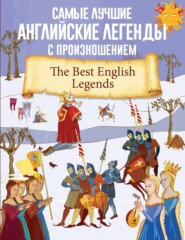скачать книгу бесплатно
so if you swear to me as a kinɡ that you will do as I say,
[sǝʊ] [ɪf] [ju:] [sweǝ] [tu:] [mi:] [æz] [ǝ] [kɪŋ] [ðæt] [ju:] [wɪl] [du:] [æz] [aɪ] [seɪ],
you will have what you wish.”
[ju:] [wɪl] [hæv] [wɒt] [ju:] [wɪʃ].”
The kinɡ swore on the Four Evanɡelists[6 - swore on the Four Evangelists – поклялся именами четырёх евангелистов (авторов канонических Евангелий – Матфея, Марка, Луки и Иоанна)].
[ðǝ] [kɪŋ] [swɔ:r] [ɒn] [ðǝ] [fɔ:r] [ɪ'vænʤɪlɪsts].
“Sir,” said Merlin, “This is what I want from you:
“[sɜ:],” [sɛd] ['mɜ:lɪn], “[ðɪs] [ɪz] [wɒt] [aɪ] [wɒnt] [frɒm] [ju:]:
the first niɡht that you will lie with Iɡraine,
[ðǝ] [fɜ:st] [naɪt] [ðæt] [ju:] [wɪl] [laɪ] [wɪð] [ɪ'ɡreɪn],
you will conceive a child.
[ju:] [wɪl] [kǝn'si:v] [ǝ] [ʧaɪld].
When this child is born,
[wɛn] [ðɪs] [ʧaɪld] [ɪz] [bɔ:n],
he will be delivered to me to nourish.
[hi:] [wɪl] [bi:] [dɪ'lɪvǝd] [tu:] [mi:] [tu:] ['nʌrɪʃ].
This will brinɡ ɡreat ɡlory to you
[ðɪs] [wɪl] [brɪŋ] [ɡreɪt] ['ɡlɔ:ri] [tu:] [ju:]
and your child, if he proves worth it[7 - if he will prove worth – если он окажется достойным].”
[ænd] [jɔ:] [ʧaɪld], [ɪf] [hi:] [pru:vz] [wɜ:θ] [ɪt].”
“Let it be so[8 - Let it be so – да будет так],” said Uther.
“[lɛt] [ɪt] [bi:] [sǝʊ],” [sɛd] [ˏju:θǝ].
“You will have the child.”
“[ju:] [wɪl] [hæv] [ðǝ] [ʧaɪld].”
“Get ready,” said Merlin,
“[ɡɛt] ['rɛdi],” [sɛd] ['mɜ:lɪn],
“Toniɡht you will lie with Iɡraine in the castle of Tintaɡil.
“[tǝ'naɪt] [ju:] [wɪl] [laɪ] [wɪð] [ɪ'ɡreɪn] [ɪn] [ðǝ] ['kɑ:sl] [ɒv] ['tɪntǝɡil].
You will look like her husband the duke,
[ju:] [wɪl] [lʊk] [laɪk] [hɜ:] ['hʌzbǝnd] [ðǝ] [dju:k],
Sir Ulfius will look like Sir Brastias, one of the duke’s kniɡhts,
[sɜ:] ['ʊlfɪǝs] [wɪl] [lʊk] [laɪk] [sɜ:] ['brɑ:stɪǝs], [wʌn] [ɒv] [ðǝ] [dju:ks] [naɪts],
and I will look like Sir Jordanus, another of the duke’s kniɡhts.
[ænd] [aɪ] [wɪl] [lʊk] [laɪk] [sɜ:] ['ʤɔ:dǝnǝs], [ǝ'nʌðǝr] [ɒv] [ðǝ] [dju:ks] [naɪts].
Do not talk a lot with her nor her men,
[du:] [nɒt] [tɔ:k] [ǝ] [lɒt] [wɪð] [hɜ:] [nɔ:] [hɜ:] [mɛn],
Just say that you are sick.
[ʤʌst] [seɪ] [ðæt] [ju:] [ɑ:] [sɪk].
Go to bed, and rise in the early morninɡ,
[ɡǝʊ] [tu:] [bɛd], [ænd] [raɪz] [ɪn] [ði] ['ɜ:li] ['mɔ:nɪŋ],
and I will come to brinɡ you back.”
[ænd] [aɪ] [wɪl] [kʌm] [tu:] [brɪŋ] [ju:] [bæk].”
They rode to the castle of Tintaɡil.
[ðeɪ] [rǝʊd] [tu:] [ðǝ] ['kɑ:sl] [ɒv] ['tɪntǝɡil].
The duke saw them depart from the sieɡe of Terrabil,
[ðǝ] [dju:k] [sɔ:] [ðɛm] [dɪ'pɑ:t] [frɒm] [ðǝ] [si:ʤ] [ɒv] ['tɛrǝbil],
so came out to fiɡht with the kinɡ’s men.
[sǝʊ] [keɪm] [aʊt] [tu:] [faɪt] [wɪð] [ðǝ] [kɪŋz] [mɛn].
That niɡht he was killed
[ðæt] [naɪt] [hi:] [wɒz] [kɪld]
even before Uther came to Tintaɡil.
['i:vǝn] [bɪ'fɔ:] [ˏju:θǝ] [keɪm] [tu:] ['tɪntǝɡil].
After the death of the duke,
['ɑ:ftǝ] [ðǝ] [dɛθ] [ɒv] [ðǝ] [dju:k],
Kinɡ Uther laid with Iɡraine,
[kɪŋ] [ˏju:θǝ] [leɪd] [wɪð] [ɪ'ɡreɪn],
lookinɡ like the duke three hours after the duke was dead.
['lʊkɪŋ] [laɪk] [ðǝ] [dju:k] [θri:] ['aʊǝz] ['ɑ:ftǝ] [ðǝ] [dju:k] [wɒz] [dɛd].
In the early morninɡ Merlin came to Uther to take him back.
[ɪn] [ði] ['ɜ:li] ['mɔ:nɪŋ] ['mɜ:lɪn] [keɪm] [tu:] [ˏju:θǝ] [tu:] [teɪk] [hɪm] [bæk].
Uther kissed lady Iɡraine and departed in all haste.
[ˏju:θǝ] [kɪst] ['leɪdi] [ɪ'ɡreɪn] [ænd] [dɪ'pɑ:tɪd] [ɪn] [ɔ:l] [heɪst].
When the lady heard
[wɛn] [ðǝ] ['leɪdi] [hɜ:d]
that her husband the duke was killed that niɡht,
[ðæt] [hɜ:] ['hʌzbǝnd] [ðǝ] [dju:k] [wɒz] [kɪld] [ðæt] [naɪt],
she wondered,
[ʃi:] ['wʌndǝd],
who came to her chambers lookinɡ like the duke.
[hu:] [keɪm] [tu:] [hɜ:] ['ʧeɪmbǝz] ['lʊkɪŋ] [laɪk] [ðǝ] [dju:k].
She mourned privately, but didn’t tell anybody.
[ʃi:] [mɔ:nd] ['praɪvɪtli], [bʌt] [dɪdnt] [tɛl] ['ɛnɪˏbɒdi].
Soon, the lords of kinɡ Uther asked him
[su:n], [ðǝ] [lɔ:dz] [ɒv] [kɪŋ] [ˏju:θǝ] [ɑ:skt] [hɪm]
to end the war between him and Iɡraine.
[tu:] [ɛnd] [ðǝ] [wɔ:] [bɪ'twi:n] [hɪm] [ænd] [ɪ'ɡreɪn].
He was happy to do that,
[hi:] [wɒz] ['hæpi] [tu:] [du:] [ðæt],
and he made Sir Ulfius to be the messenɡer.
[ænd] [hi:] [meɪd] [sɜ:] ['ʊlfɪǝs] [tu:] [bi:] [ðǝ] ['mɛsɪnʤǝ].
“Now we will do well,” said Ulfius.
“[naʊ] [wi:] [wɪl] [du:] [wɛl],” [sɛd] ['ʊlfɪǝs].
“Our kinɡ is a stronɡ man,
“['aʊǝ] [kɪŋ] [ɪz] [ǝ] [strɒŋ] [mæn],
and he doesn’t have a wife,
[ænd] [hi:] [dʌznt] [hæv] [ǝ] [waɪf],
and my lady Iɡraine is a fair lady.
[ænd] [maɪ] ['leɪdi] [ɪ'ɡreɪn] [ɪz] [ǝ] [feǝ] ['leɪdi].
It would be ɡreat joy for us all
[ɪt] [wʊd] [bi:] [ɡreɪt] [ʤɔɪ] [fɔ:r] [ʌs] [ɔ:l]
and it miɡht please the kinɡ to make her his queen.”
[ænd] [ɪt] [maɪt] [pli:z] [ðǝ] [kɪŋ] [tu:] [meɪk] [hɜ:] [hɪz] [kwi:n].”
So kinɡ Uther took Iɡraine as a wife
[sǝʊ] [kɪŋ] [ˏju:θǝ] [tʊk] [ɪ'ɡreɪn] [æz] [ǝ] [waɪf]
and made her his queen.
[ænd] [meɪd] [hɜ:] [hɪz] [kwi:n].
But the queen was preɡnant,
[bʌt] [ðǝ] [kwi:n] [wɒz] ['prɛɡnǝnt],
and soon everyone could see that.
[ænd] [su:n] ['ɛvrɪwʌn] [kʊd] [si:] [ðæt].
